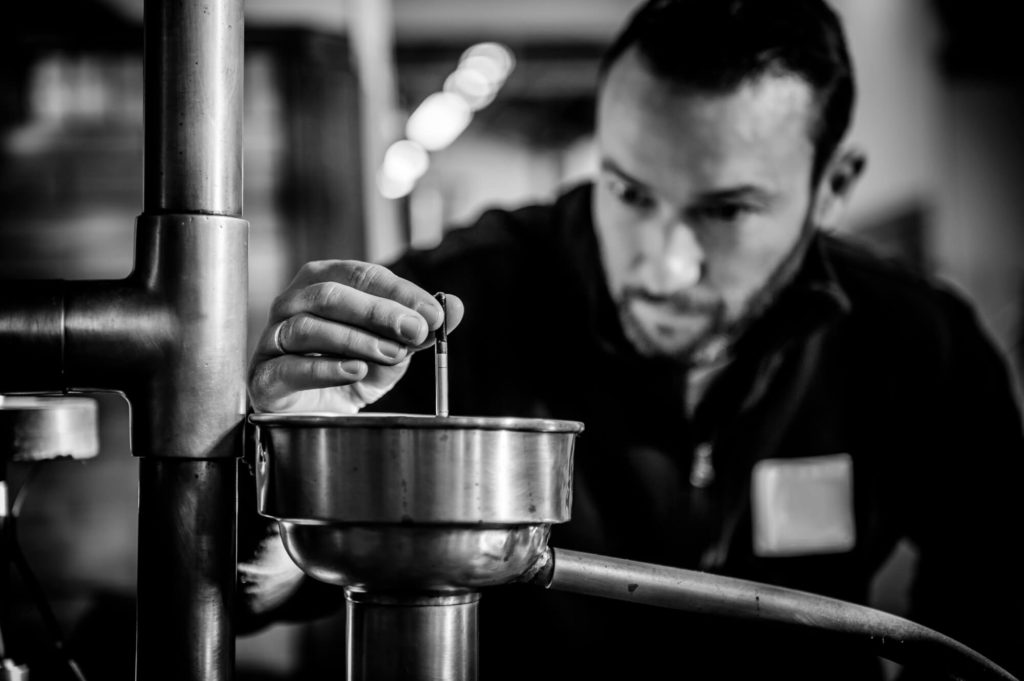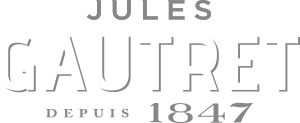The professions linked to the elaboration and marketing of Jules Gautret Cognac are distinguished by their diversity thanks to the support of the Charente Cooperative Group, as well as numerous partners in the region.
Each profession is an essential link in the production of Cognac and benefits from an extreme wealth of know-how and techniques.
We invite you to meet Damien, Master Distiller at our distillery in Mosnac. He has kindly accepted to answer our questions, in order to learn more about his job.
Can you briefly summarize your job and its description?
–
The exact term is “Master Distiller”, which consists of transforming wine into eau-de-vin using batch boilers.
–
So what is the difference between a distiller and a chief distiller?
–
I’m the person who trains new distillers in our distillation methods, I teach novices, and manage the distillation teams.
In fact, you’re kind of the orchestra conductor! When did you start working at our distillery and what did you do before?
I started at the distillery in 2019, replacing a colleague who was retiring. However, I was not completely new to the business, as I had previously worked for 15 years in the world of wine at the Saint-Sulpice-de-Royan cave. Before that, I was part of the team of our Archiac winery for the harvest season following my spontaneous application in 2004.
Since there is no official training to learn distillation, how did you learn the job?
Distillation is a transmission of knowledge through learning. It is a case of practice makes perfect that one learns how to distill correctly. For my part, I had to learn the trade quickly, in order to be fully operational at my post before my colleague retired. He is the one who taught me what I know today about distillation, even though as a youngster, I had an attraction for distillation and stills, as my parents owned one. Once I learned the basics, I perfected my skills over time.
Was it the job you dreamed of as a child?
Like many children, I wasn’t sure of the exact job I wanted to do, but one thing was sure, I wanted to work in the wine world. And I got there by force of circumstances.
Today, do you get tired of this job?
Not at all. The advantage of distillation is that no two days are alike.

Can you tell us more about it?
The morning is punctuated by the counts, which is the most recurrent task from one day to the next. The afternoons are quite different, we have to manage the arrival of the wines in the vat house, then the distillation according to the vintages. Each vintage has its own specificity, which means we have to adapt our distillation methods accordingly. We also have to carry out and supervise the pumping as well as the preparations for the transfers and the transfers of eaux-de-vie themselves from one site to another. Not to mention the management of the teams of distillers for the distillation season, or the setting up of the ageing process that I carry out with Pierrick.
Ageing, just like distillation, is a crucial step in the making of a cognac. Can you tell us more about the different containers you use to age your eaux-de-vie ?
After its production, the eau-de-vie is placed in casks for 3 years to start its ageing. After being reduced, a part is used for blending and the rest is kept and placed in barrels or again in casks. This ageing in wood allows the cognacs to improve, even more so when the ageing is done in casks, as this smaller container gives color and aromatic intensity to the cognacs.
The distillation period is not the easiest season of the year, what about your working hours?
I have a fairly stable work schedule throughout the year, during and outside the distillation period. During this period, which lasts 5 to 6 months, it is regular that weekends are restrained in order to carry out the counts or to deal with possible problems that may arise in the distillation process.
Would you say that this is the hardest part of your job?
On the whole, I think so. But there are also many good things about the distillation period. The tasks are very varied from the beginning of the campaign until March 31, which is a little less true during the rest of the year when we work mainly in the cellars.










